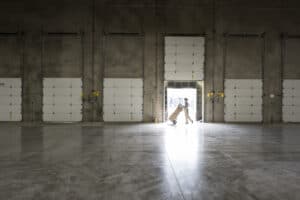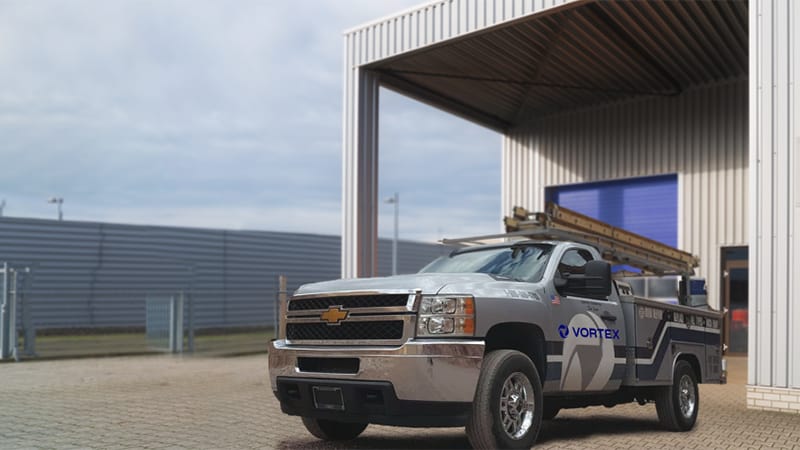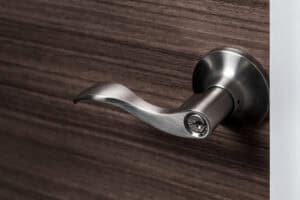Why Do Commercial Garage Door Springs Break?

Springs play a critical role in commercial garage door systems. They counterbalance the door’s weight, reducing the force required to raise and lower it. Besides ensuring smooth and consistent movement, they also reduce the strain on the garage door opener and act as a safety measure, preventing the door from suddenly slamming shut. Most garage springs are made from galvanized or oil-tempered steel wire, designed to last up to twelve years or 20,000 cycles. But like any essential component, springs don’t last forever. To help you avoid unexpected breakdowns, this blog will explore the reasons why garage door springs break and what can be done to extend their lifespan.
Common Causes of Spring Failure
There are two types of spring systems: torsion springs and extension springs. Torsion springs are the most common. They’re tightly wound, helical coils that store and release mechanical energy when twisted. Extension springs control movement by stretching and contracting. Unlike torsion springs, extension springs are mounted along the sides of the door rather than above it.
Though cheaper and easier to install, extension springs are not a popular choice for most garages, warehouses, and loading docks because they typically last for only 10,000 cycles, while torsion springs last twice as long. However, no matter which type of spring you choose, they’re both susceptible to the same operational and environmental strains, such as:
Wear and Tear
Commercial doors typically weigh between five hundred and a thousand pounds, while an industrial door designed for rugged environments can weigh even more. This puts a large amount of stress on your springs every time the door opens and closes. Over time, the constant pressure creates micro-fractures in the metal, which gradually accumulate until the springs can no longer function.
Corrosion
Springs exposed to moisture will eventually rust, which increases friction and weakens the coils. This is a particular hazard in humid locations, where high levels of water vapor regularly condense on the metal, leading to oxidation. Coating your springs with a silicone-based lubricant will create a protective barrier against moisture. It should be reapplied at least once a year.
Temperature Fluctuations
Extreme heat causes metals to expand, while extreme cold causes them to contract. Constant fluctuations subject springs to additional stress, increasing the likelihood of failure. Freezing temperatures are particularly hazardous, as they make springs brittle and prone to snapping.
Overloading
Garage springs need to be carefully matched to your door. Installing springs that are too small to support the door’s structure will place so much pressure on the metal coils they won’t be able to stand up to normal use, resulting in premature breakage.
Poor Installation
Garage doors require balance in order to function. If your door wasn’t properly installed, it might not sit evenly in the frame, forcing one of the springs to bear more weight and wear down faster.
Lack of Maintenance
Regular maintenance reduces friction and ensures quiet operation, while also minimizing exposure to moisture and humidity. Besides cleaning and lubricating the springs, Vortex maintenance teams also check for loose components and perform a balance check to ensure the door opens in a safe, controlled manner.
Signs of Wear
A broken garage door spring isn’t only an inconvenience. It’s also potentially hazardous. An unstable door can come off its tracks or overload the opener, causing it to burn out. In some cases, a broken spring can cause the door to fall or slam shut without warning, potentially injuring someone underneath it. To avoid accidents and unexpected downtime, business owners and property managers need to watch for:
- Frayed wires
- Visible gaps in the springs
- Doors that struggle to open or close
- Squeaking or grinding noises
- Crooked doors that raise or lower unevenly
- Doors that close forcibly
- Loud noises, similar to a firecracker or gunshot
If you notice any of these signs, stop using the door immediately to avoid further issues. Don’t attempt to replace the spring yourself. Garage door springs are under high tension and can cause serious injury if not handled by a trained professional.
Commercial Garage Door Spring Repair
Vortex repair teams get your equipment back in working order as soon as possible. When a spring fails, our technicians respond quickly, replacing damaged components and ensuring proper maintenance is carried out on the remaining pieces, so your roll-up and overhead doors continue to function as expected. Contact us today to schedule a service appointment or learn more about our commercial garage door services.










